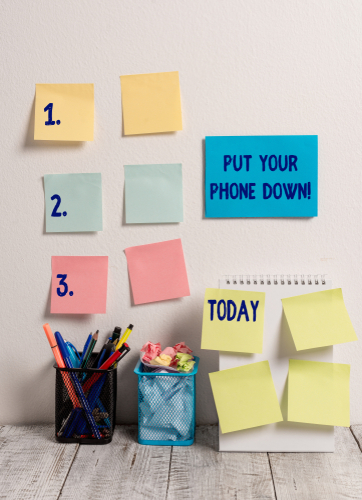Summer is here! And so is the new fiscal year.
Instead of letting the year sneak by you, here are a few tips and tricks to help you maximize your time and money in the upcoming year.
1. Set a Goal for Each Quarter/Semester

It’s easy to feel energized at the start of a new year, but don’t forget, time is like toilet paper…it will run out when you need it most! With that in mind, instead of making a laundry list of every project you want to get done this year, choose the single most important task or project and decide to get it done (or at least in motion) this quarter. Then, break that task into its smaller, component tasks so you can wrap your head around the steps that are required to get it done. After that, get started on task number one!
By picking one major task for the semester or quarter, you’ll be able to focus on (and complete) those priorities that are most important for the year while also making time for your day-to-day responsibilities.
2. Keep Priorities Visible

Last year, you set goals. And the year before that. But how often did you actually complete those goals? This year, you can change all that. How? By printing them out and keeping them visible. Why is it important to keep your goals top-of-mind? Because writing them down and seeing regularly makes you more likely to accomplish them, according to the latest neuroscientific research into goal setting.
When you start planning for the week or your day, having your goals posted allows you to check in with your priorities to see if the tasks you’re spending time on are helping you meet those goals. You’ll find you’re more productive and more likely to stay on track when you keep your priorities visible.
3. Set Calendar Reminders for Key Planning Times

As obvious as it sounds, it’s important to make time to think and plan! But we get it—given our constant pressures and deadlines in marketing, it’s often hard to find time. Who has time to plan when there is so much to get done now? But the truth is, you know as well as we do that planning now will actually save you time later. Sure, there’s research out there that will prove this to you, but who cares. We all know it’s true. We just need to find time to do it.
So, instead of putting this off, block off chunks of time on your calendar now. Give planning the respect you give your weekly team meetings. Give yourself a regular, 1-hour slot first thing Monday morning to plan your week. Or set a date to plan your quarterly goals. Setting the date and time in your calendar will make the task feel more important and urgent, and also prevent others from scheduling you elsewhere. All of this will make you more likely to focus on the important things and less likely to waste time looking at cat videos. (Wait, is that just us?)
4. Schedule Meetings or Send Email Reminders Prior to Busy Times

When planning, make a note of especially busy times and keep in mind the kinds of requests you tend to get during those times. Chances are, you’ve been there before and might be able to reasonably predict where the “last-minute” emergencies will be coming from.
Even if though we can’t predict what emergencies will interrupt our work, we can be proactive about protecting our time. So instead of waiting for everyone to come to you, reach out to them to find out what their needs are or may be. Maybe there are tasks you can get done before things get busy. Maybe there are tasks that can wait. The idea is to reach out when you have more capacity to help other departments so you can assist them on your schedule, not theirs.
By being proactive, you can talk through the needs of your colleagues to make sure you have the information you need to support them while also meeting your deadlines.
5. Set KPIs and Track Throughout the Year

Setting key performance indicators (or KPIs) early is the easiest and best way to make sure you’re tracking success, meeting goals, and evaluating your practices. For example, recording the number of new applicants is a KPI you might use to understand the efficacy of a new enrollment-focused marketing campaign you’re running. The key to setting KPIs is identifying them early and getting them set up so they can deliver the most complete and relevant data. This also gives you a chance to make sure your data collection process will be effective and accurate. In the end, this will make it easier for you to report on your successes, instead of wasting time “scrubbing” your data to make sure it makes sense.
6. Keep an “Idea Box”

Rather than writing your ideas down in various places and losing your notes, try creating a cloud-based “idea box” to centralize your ideas. Just create a doc and keep it updated with all those notes that you’ve been jotting down on scraps of paper. By keeping a running list on a platform like Google Docs, you’ll be able to update your list on the go. Since your ideas will be in one place, it’ll make using them and sharing them with your team even easier!
7. Marie Kondo Your Desk (and Desktop and Inbox…)

Long before Marie Kondo taught us how to fold our underwear, eliminating desk clutter has been considered a key to staying organized and on top of goals and work! Check out this article from the Harvard Business Review for a quick breakdown of the “whys” behind decluttering your workspace.
What it all adds up to is this: It will make you a happier person if you regularly take time to organize your work area. And it’ll make you more productive. By committing to keeping your desk (and desktop) clean, you force yourself to spend time organizing and prioritizing information related to what files you need and what tasks need to get done. Whether following Marie Kondo’s advice gives you that zen-like enlightenment you crave depends, but we can promise you this: it will feel good on your brain and your underwear drawer will look awesome.
8. Achieve Work-Life Balance by Writing Down Tomorrow’s To-Do List Today.

This isn’t another lesson on procrastination, but a proven way to increase productivity AND help yourself “shut down” at the end of the day. When Ivy Lee taught this method to Charles Schwab, he simply told Schwab to pay him what he thought it was worth. Schwab paid him about $25,000. Not terribly impressive until you realize this was in 1918 and that $25,000 is equal to almost half a million bucks today.
So what was the lesson? Make your to-do list the night before.
Here’s why it works: By taking a few minutes to think about what you have to do tomorrow and writing those things down, you accomplish two things: First, it makes it easier to relax by turning stress-inducing mental lists into actionable tasks. This process short circuits the worry-centers of our brains by activating the pre-frontal cortex—the area that is connected to planning, organization, and feelings of well-being. Second, it makes tomorrow less stressful because you’ve already taken control of what needs to be done.
Hopefully, some of these ideas will help get your new fiscal year off to a great start. But if you’re still feeling weighed down or overwhelmed by what’s ahead, all you have to do is call! We are the two-year experts after all. Plus, our underwear drawers are awesome.



